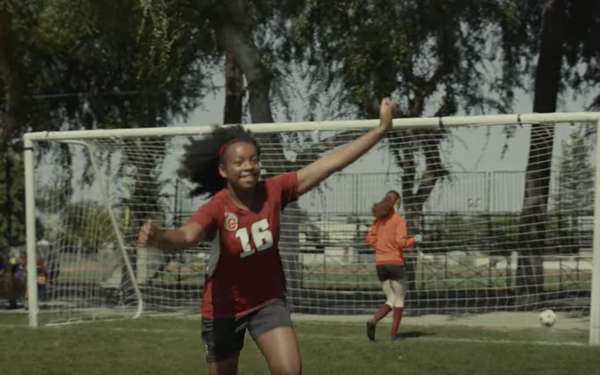Commentary
Hyundai's Olympic Spot Speaks To Different Kind Of Greatness
- by Barbara Lippert , Columnist, August 1, 2024

Following the dream of greatness—and never giving up—is a basic trope in the making of Olympians, and fueled a lot of the imagery in Olympic advertising.
Or at least it used to.
Whereas “It’s OK,” this gentle, thought-provoking Hyundai commercial, running since the start of the Paris Olympics, takes a more modern, enlightened, kid-saving approach.
The spot, created by Innocean USA, addresses an issue in children’s sports that is rarely brought up, especially in ads.
That is, what happens to a kid when it’s all too much?
The spot ventures into the tough, messy areas of mental health and finding happiness in the face of pressure, and the parental sensitivity required to guide the child.
advertisement
advertisement
Most parents who have the means to support their kids attending regular practices and being on uniformed sports teams, or taking intensive classes, or training at an elite level, will relate.
It’s about that intimate time spent in the car, (or in this case, an admirably downplayed array of great-looking Hyundai SUVs) going back and forth to games or practices.
The young players, runners, swimmers, or skaters being ferried don’t particularly want to open up, while their parents yearn for connection.
In this warmly shot spot, we get different vignettes that capture the sometimes-awkward interactions in the car at 5 a.m. or coming home post-sunset.
The dialogue cuts through and feels organic.
We get to be in the backseat.
“How was practice?” asks one mom at the wheel, who gets a monosyllable from her swimmer daughter: “Good.”
“You okay, man?” the dad asks his son the wrestler. “I don’t know” is the answer.
“You know, you don’t have to keep doing this,” says another mom. “I can tell you’re doing it for that look on my face.”
In the end, the parents give their kids permission to “take a break” or “switch things up.”
But it’s tough to know when and how much.
A friend recently told me about her 12-year-old son, a serious kid who had struck out at bat during his final baseball game of the season. Afterwards, when she found him, he was crying. So she hugged him and said, “Oh, honey, just have fun. We’re here to have fun!”
Still half-crying, the kid looked up and asked, “But how can I have fun and be competitive?”
That’s a question for our age.
Jason Sperling, chief creative officer at Innocean USA, told me in a phone call that some of the stories were “modeled after conversations I had with my own three kids.”
“One of my daughters did gymnastics and feigned injury for three months, because the coach had yelled at her,” he said. “My son played baseball in high school and by the end, I could tell something had taken his love away.”
He said sometimes it’s the parents who put unrealistic expectations on the kids. Other times, it’s coaches. And sometimes it’s the kids who pressure themselves.
“Too often we buy into the fact that you have to give the kid a trainer at four,” Sperling said. “And if you haven’t made a great team at five, it’s all over. Or that you must play 365 days a year, or you regress.”
Sperling said he would like to make this idea of not pressuring kids into pursuing a sport at the highest level unless they love it “more of a cultural conversation” and “broaden it beyond the Olympics.”
“We sponsor sports. We sponsor sports teams,” he said of his client, Hyundai. “But I would like to sponsor joy. “
“Never give up on finding what you love,” the final title card reads. “There’s joy in every journey.”
Not everyone can become an Olympian. The message here is that there is time and room for different pursuits.
And maybe even having fun while staying competitive.



